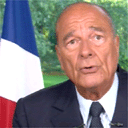Europe the peacekeeper
Sending stabilising forces to Lebanon may be good for the EU’s image, but the task ahead has been dubbed ‘mission impossible’, says Ian Black
Guardian Unlimited | Friday August 25, 2006
 President Chirac has pledged to send more troops to Lebanon. Photograph: Getty Images |
Jacques Chirac may have saved the honour of France by pledging 2,000 men for the expanded UN stabilisation force in Lebanon. Now Italy is expected to more than match this figure and other European countries are signing up to ensure they also have respectable numbers serving under EU flags. The mission remains extremely delicate and volatile, with people of goodwill only able to wish it well. Still, it’s a fair bet that some participants may yet come to regret their decision.
France played the central role in galvanising the painfully slow efforts to agree a ceasefire between Israel and Hizbullah guerrillas on August 14, but came under scathing criticism, especially in the US, for sending just 200 extra soldiers to bolster the existing UN force. Unifil, the United Nations Interim Force in Lebanon, was first deployed (on a temporary basis, as its name suggests) after Israel’s invasion back in 1978 when its enemy was the Palestinians. Unifil never managed to do its job effectively and its toothless vulnerability was brutally underlined during the recent fighting when four soldiers were killed by Israeli shells.
It seems only right that France should play its part. Its influence in the region is linked to the League of Nations mandate it administered in Syria and Lebanon between the world wars (while Britain was running Palestine and Jordan) and it has especially close relations with Lebanon’s Maronite Christian community.
France is less popular with the country’s Shia Muslims, not least because Mr Chirac has been combative in seeking to curb the influence of Iran, Hizbullah’s chief backer. In an unusual partnership with George Bush, he also sponsored diplomatic moves at the UN to have the Shia organisation disarmed and Syrian forces withdrawn after the assassination of his friend, the former Lebanese prime minister, Rafiq Hariri. It bodes badly that relations between Paris and Damascus – which opposes the UN deployment – are at such a low point.
Talks in Brussels on the composition of the new force offer a golden opportunity for the EU to put some muscle behind its long-stated ambition to play a bigger global role, and this time in its own Middle Eastern backyard. Britain, the union’s biggest military power, cannot be involved. The official reason is because of its existing commitments in Iraq and Afghanistan. In reality, it is also disqualified as being far too close to US policy in the region.
Among the EU’s other big players, Germany is also a strong supporter of the UN mission. It has come out of its post-second world war shell by deploying troops to the Balkans and Afghanistan in recent years but the long shadow of the Holocaust still makes it hard for Germans to conceive of using force on Israel’s borders. Italy’s Romano Prodi moved smartly to offer a substantial contribution of up to 3,000 men, a centre-left approach to rebuilding transatlantic bridges without emulating Silvio Berlusconi’s support for George Bush over Iraq.
An Italian turf war with France over the command of the force has been uneasily resolved. Still, contingents from Belgium, Spain, Poland, Greece and Finland – perhaps with other Nordic countries – should convey a sense that this is a Europe-wide effort. The risks are being shared out.
And no one doubts that these are very considerable. Even if the rules of engagement are now sufficiently robust to allow UN troops to defend themselves, there is no appetite for restoring the original security council goal of disarming Hizbullah, which sparked the war with its raid on Israel on July 12. The French have not forgotten that they lost 58 men in Beirut on the same 1983 day that 241 US marines were killed by a suicide bomber belonging to a little-known Shia Muslim organisation – called Hizbullah.
President Chirac may not be quite as unpopular in Lebanon as Mr Bush, or Israel’s Ehud Olmert, but there can be no guarantee that French “casques bleus” will not become pawns in a wider struggle. Israel’s record suggests it will have no hesitation in ignoring or endangering UN personnel if they get in its way. Nevertheless, one significant novelty is that this is the first time Israel has ever welcomed a UN force on its borders – precisely because it understands that it could not defeat Hizbullah and desperately needs international help to keep it at bay.
Question marks remain over whether Israel, still maintaining an air and sea blockade of Lebanon, will accept participation in the UN force of Muslim countries such as Indonesia and Bangladesh which do not have diplomatic relations with the Jewish state. If it doesn’t, then one of the world’s most dangerous front lines will be manned largely by European soldiers.
But getting enough troops in place between Israel and the Litani river may turn out to be the easy part of what some are already dubbing “mission impossible”. Military experts see alarming parallels with Bosnia in 1994, when the UN was sent in to enforce a peace that did not exist, bravely escorting relief convoys to Muslims while they were being starved and shelled by Serbs. This new Middle Eastern mission, in which UN troops will have to help Lebanese soldiers control the country’s dangerous south, could turn out to be even tougher.

Recent Comments